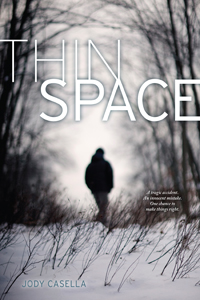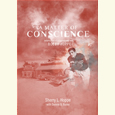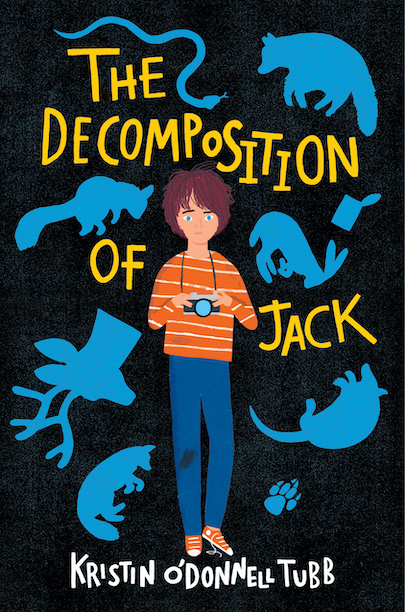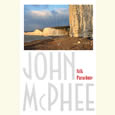A Twin, Untwinned
Jody Casella’s debut novel is a convincing portrayal of a young man’s staggering loss—of both sibling and self
Trauma can make a person do strange things, take desperate measures to find bearings in a world that has been turned upside down. Marsh Windsor, the teen protagonist of Jody Casella’s deeply affecting debut novel, Thin Space, responds to tragedy by going barefoot—in school hallways, on the snow-crusted sidewalks of his neighborhood, everywhere. His teachers and parents look the other way in the name of allowing him to grieve: just two months have passed since his identical twin, Austin, was killed in a car wreck, with Marsh at the wheel.
 But what nobody imagines is the real reason behind Marsh’s odd behavior. He’s seeking a “thin space,” a passage through which it’s possible to slip into the afterlife. Created when a person both enters this world and passes from it in the same location, a thin space can be entered under only one condition: the living person must be barefoot. This, at least, is the story Marsh has heard from his elderly neighbor, Mrs. Hansel, who herself passes away shortly after the twins’ tragic accident. To slip into a thin space would allow Marsh to see his brother again, and, he believes, to right some wrongs.
But what nobody imagines is the real reason behind Marsh’s odd behavior. He’s seeking a “thin space,” a passage through which it’s possible to slip into the afterlife. Created when a person both enters this world and passes from it in the same location, a thin space can be entered under only one condition: the living person must be barefoot. This, at least, is the story Marsh has heard from his elderly neighbor, Mrs. Hansel, who herself passes away shortly after the twins’ tragic accident. To slip into a thin space would allow Marsh to see his brother again, and, he believes, to right some wrongs.
Marsh’s world is shattered by loss and a crippling sense of guilt—and on top of that, he struggles with an anxiety that, while not unique to being a twin, is certainly all the more piercing for it: the feeling that he’s never truly been known by anyone. He and Austin could (and did) trick even their best friends and girlfriends into thinking one was the other: “My brother and me, maybe we looked alike, but we weren’t alike in other ways,” he reflects. “In the end it doesn’t matter. People saw us how they wanted. To them, we were alike in the ways that count. Looks. Athletics. Academics.”
Clearly more than just a twin’s lament, that identity struggle is one with which any teen—or anyone who has been a teen—can empathize. And the frustration and alienation that come with feeling known or valued only in terms of the narrowly defined roles and hierarchies of the typical high-school ecosystem is all the more poignant, even oddly refreshing, when given voice to by a young man who, until this point, has always walked among the popular kids. Casella’s take on an angry, confused young man’s voice is utterly convincing, as are the broad strokes she uses to paint a portrait of that thorny high-school world: the bouncy ponytails of the girls, the square jaws of the football players.
 One of those ponytailed girls is Marsh’s neighbor and new-kid-in-town, Maddie, whose family moves into the late Mrs. Hansel’s house. Her protective brother Sam, a lacrosse player, quickly takes the role of nemesis, frowning on his little sister’s budding friendship with “messed up” Marsh, but the connection endures: in Maddie, Marsh finds someone who knows him on new terms, as an individual, rather than the near-mirror image of his twin. He also finds a fellow seeker: Maddie, who lost her father when she was only six and who harbors some troubles of her own, eagerly joins Marsh in his search for a thin space.
One of those ponytailed girls is Marsh’s neighbor and new-kid-in-town, Maddie, whose family moves into the late Mrs. Hansel’s house. Her protective brother Sam, a lacrosse player, quickly takes the role of nemesis, frowning on his little sister’s budding friendship with “messed up” Marsh, but the connection endures: in Maddie, Marsh finds someone who knows him on new terms, as an individual, rather than the near-mirror image of his twin. He also finds a fellow seeker: Maddie, who lost her father when she was only six and who harbors some troubles of her own, eagerly joins Marsh in his search for a thin space.
When Marsh is finally called to face his demons, readers may gasp in astonishment. But the real breath-taking punch of this novel is in its convincing, carefully constructed portrayal of a young man’s staggering loss—of both sibling and self—and his courageous confrontation of some very difficult truths. A way out, he realizes, has “got nothing to do with taking off my shoes. It’s got nothing to do with searching for doorways out of this world.” In Marsh Windsor’s journey toward healing, Casella—a graduate of both Rhodes College and the University of Memphis—delivers a heartbreaking story about grief and a search for identity, one that breathes new life into that classic YA theme.
Jody Casella will discuss Thin Space at The Booksellers at Laurelwood on October 26, 2013, at 2 p.m.


